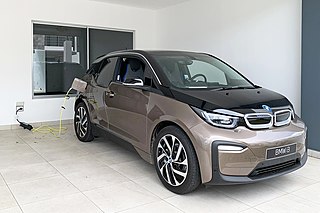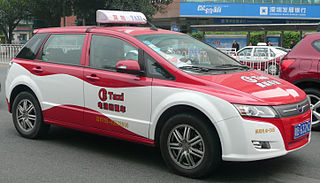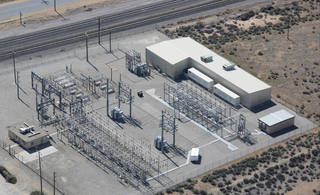
An electric vehicle (EV) is a vehicle that uses one or more electric motors for propulsion. The vehicle can be powered by a collector system, with electricity from extravehicular sources, or can be powered autonomously by a battery or by converting fuel to electricity using a generator or fuel cells. EVs include road and rail vehicles, electric boats and underwater vessels, electric aircraft and electric spacecraft.

The economy of Quebec is diversified and post-industrial with an average potential for growth. It is highly integrated with the economies of the rest of Canada and the United States. Manufacturing and service sectors dominate the economy.

The lithium iron phosphate battery or LFP battery is a type of lithium-ion battery using lithium iron phosphate as the cathode material, and a graphitic carbon electrode with a metallic backing as the anode. Because of their low cost, high safety, low toxicity, long cycle life and other factors, LFP batteries are finding a number of roles in vehicle use, utility-scale stationary applications, and backup power. LFP batteries are cobalt-free. As of September 2022, LFP type battery market share for EVs reached 31%, and of that, 68% was from Tesla and Chinese EV maker BYD production alone. Chinese manufacturers currently hold a near monopoly of LFP battery type production. With patents having started to expire in 2022 and the increased demand for cheaper EV batteries, LFP type production is expected to rise further and surpass lithium nickel manganese cobalt oxides (NMC) type batteries in 2028.
Exide Industries Limited (Exide) is an Indian multinational storage battery manufacturing company, headquartered in Kolkata, India. It is the largest manufacturer of lead-acid storage batteries and power storage solutions provider in India.

Battery recycling is a recycling activity that aims to reduce the number of batteries being disposed as municipal solid waste. Batteries contain a number of heavy metals and toxic chemicals and disposing of them by the same process as regular household waste has raised concerns over soil contamination and water pollution. While reducing the amount of pollutants being released through disposal through the uses of landfill and incineration, battery recycling can facilitate the release of harmful materials from batteries to both the environment and the workers recycling batteries.

An electric vehicle battery is a rechargeable battery used to power the electric motors of a battery electric vehicle (BEV) or hybrid electric vehicle (HEV).

La Corne is a municipality in the Canadian province of Quebec in Abitibi Regional County Municipality.
L'Institut de recherche d'Hydro-Québec(Hydro-Québec Research Institute), known by its acronym IREQ is a research institute established in 1967 by government-owned utility Hydro-Québec. IREQ operates from Varennes, a town on the south shore of Montreal, Quebec, Canada. IREQ operates on an annual research budget of approximately $100 million and specializes in the areas of high voltage, mechanics and thermomechanics, network simulations and calibration.
E-One Moli Energy Corp. is a Taiwanese manufacturer of lithium-ion batteries. It was founded in 1998 and focused on producing high capacity energy cells for notebook computers, high-end electronics and networking communication devices under the "Molicel" brand.

The electric vehicle industry in China is the largest in the world, accounting for around 57.4% of global production of electric vehicles (EVs) and around 500,000 exports in 2021. In 2021, CAAM reported China had sold 3.34 million passenger electric vehicles, consisting 2.73 million BEVs and 0.6 million PHEV, which is around 53% share of the global market of 6.23 million "new energy" passenger vehicles – BEVs, PHEVs, and HEVs. China also dominates the plug-in electric bus and light commercial vehicle market, reaching over 500,000 buses and 247,500 electric commercial vehicles in 2019, and recording new sales of 186,000 commercial EVs in 2021.

Saft is a French company involved in the design, the development and the manufacturing of batteries used in transport, industry and defense. Headquartered in France, it has an international presence.

"Qui peut vivre sans amour?" is a song recorded by Canadian singer Celine Dion, released as the third single from her French-language album, Sans attendre (2012). It was written by Elodie Hesme and David Gategno, and produced by Julien Schultheis and Gategno. "Qui peut vivre sans amour?" received generally favorable reviews from music critics, who called it an orchestral rock power ballad. The well-received music video for the song premiered on 19 April 2013.

A battery storage power station, or battery energy storage system (BESS), is a type of energy storage power station that uses a group of batteries to store electrical energy. Battery storage is the fastest responding dispatchable source of power on electric grids, and it is used to stabilise those grids, as battery storage can transition from standby to full power in under a second to deal with grid contingencies.

Targray Technology International Inc., commonly referred to as Targray, is a Canadian multinational materials distributor headquartered in Kirkland, Quebec that provides commodities and distribution of pulses, biofuel, cotton, carbon trading, lithium-ion battery, energy storage, and solar photovoltaics.

The Chevrolet Menlo (畅巡) is an electric compact wagon/CUV, sold exclusively in China. It is the first Chevrolet EV available in China.
Northvolt AB is a Swedish battery developer and manufacturer, specialising in lithium-ion technology for electric vehicles. Founded in 2015 by two former Tesla executives, it commissioned its first manufacturing plant in Skellefteå, Sweden in 2021 and has announced plans for five others in Europe and North America.

Bruno Georges Pollet BSc(Hons) MSc PhD AHEA FRSC, is a French electrochemist and electrochemical engineer, a Fellow of the Royal Society of Chemistry, full professor of chemistry, director of the Green Hydrogen Lab and member of the Hydrogen Research Institute at the Université du Québec à Trois-Rivières in Canada. He has worked on Hydrogen Energy in the UK, Japan, South Africa, Norway and Canada, and has both industrial and academic experience. He is regarded as one of the most prominent Hydrogen experts and one of the Hydrogen "influencers" in the world.

Redwood Materials, Inc. is an American company headquartered in Carson City, Nevada. The company aims to recycle lithium-ion batteries and produce battery materials for electromobility and electrical storage systems. Redwood Materials was reported to have a valuation of about $3.7 billion as of July 2021.
As of March 2022, there were about 76,000 fully electric vehicles and 57,000 plug-in hybrid vehicles in Quebec. As of 2021, about 6.8% of new vehicle registrations in Quebec were electric.
Karim Zaghib is an Algerian-Canadian electrochemist and materials scientist known for his contributions to the field of energy storage and conversion. He is currently Professor of Chemical and Materials Engineering at Concordia University. As former director of research at Hydro-Québec, he helped to make it the world’s first company to use lithium iron phosphate in cathodes, and to develop natural graphite and nanotitanate anodes.













